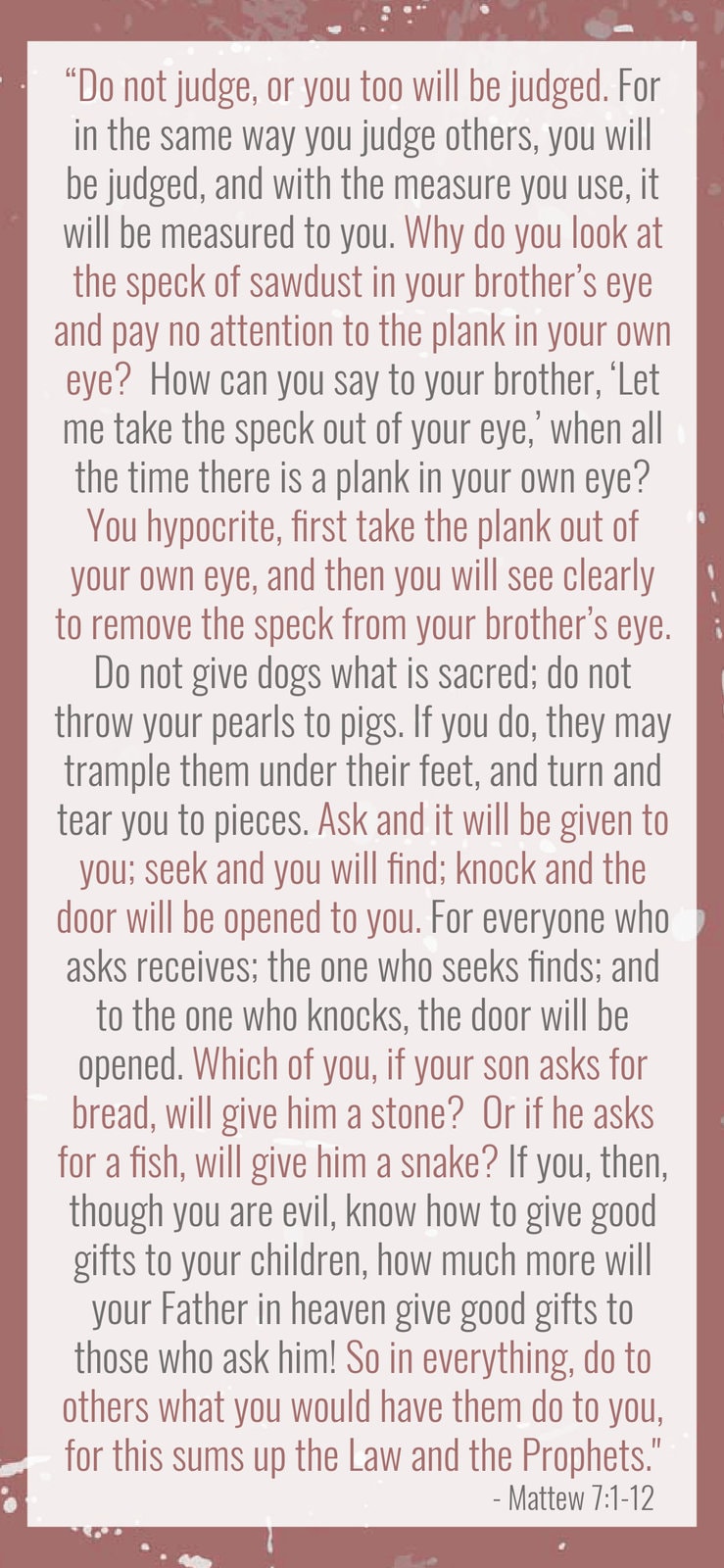Living in the twenty-first century, with all of our new-fangled technology and ideologies (and all their accompanying problems), it’s tempting to fall into the mindset that EVERYTHING is new, that the issues we are facing are entirely unprecedented, that nobody in all of history has dealt with the types of things we are dealing with today. And to some extent that’s true. But in other areas, the writer of Ecclesiastes was right when he said there was nothing new under the sun.
I find it comforting when I come across a passage of scripture that addresses a perennial problem. Scratch that—comforting isn’t the right word, because it is tinged with a sense of regret over the realization that, after all this time, there are issues we humans still haven’t sorted out. But I can’t help but find it reassuring to know that Scripture speaks to issues that are relevant today, but aren’t exactly new.

I feel this sense of ambiguous reassurance as I read the passage from the Sermon on the Mount in which Jesus speaks to the issue of judging others. Jesus cautioned His first-century audience against growing overambitious in their critiques of others’ behavior. It wasn’t that they were to avoid speaking into one another’s lives and sin patterns altogether, but they were to address their own problems before even considering the sins of others. Each individual was to acknowledge their sin nature, repent of their transgressions, and turn with full obedience to Jesus. Only then did they have a modicum of credibility with which to address another’s sins.
“Judging” is clearly an issue of significance for us modern folks, too. In contemporary society, where cancel culture reigns and harsh social media rants are a given, Jesus’ words are just as relevant. Jesus, in His wisdom that exists outside the bounds of time, knew what was ahead for humanity when He commanded His followers not to judge one another. He knew how we would continue to focus on others’ flaws before taking a look at our own. He knew that hypocrisy and pride would continue to be some of the most insidious sins to permeate humanity. His commands echoed beyond the periphery of His first-century audience and out to us, two thousand years later, where we need these cautions more than ever before.
Many of the sins Jesus talks about in the Sermon on the Mount are not ones I struggle with: I’ve never been tempted to murder, or come close to committing adultery. I generally get along well with others. But “judging” hits close to home. As an Enneagram 1, my natural bent is to notice things that are wrong. My critiques are most often of myself, but sometimes my gaze shifts outwards in my misguided efforts at feeling better about my own shortcomings: I grow unhappy with a personal flaw, and my response is to ignore the flaw and turn my microscope towards the flaws of people around me. Derision for others’ missteps feels so much better, and is so much less threatening, than addressing my own shortfalls or suffering under the weight of self-loathing, so I give in to the sin of judgment. I don’t usually verbalize these critiques (not out of altruistic motives, but because I’m too afraid I will be perceived as “not nice”) . . . but the judgment festers within me, hardening a tender heart into one of bitterness, resentment, and disdain.
Jesus’ heart towards us—towards me—is just the opposite. Mercy replaces judgment; compassion overpowers harshness; grace supplants contempt. It is this same posture of kindness, gentleness, understanding, and forgiveness that He seeks from His disciples. If we are to lay claim to the title of Jesus Followers, we must be willing to follow in His footsteps—relinquishing the “right” to judge others and offering kindness instead.

I cannot do this on my own. At the same time, I know Jesus would not ask something of us that He would not empower us to do. When He left, He gave the gift of the Holy Spirit whose fruit includes patience, kindness, gentleness, and goodness. Father, may we be filled with your Spirit and heavy with spiritual fruit that overwhelms a judgmental spirit and turns it to one of love.